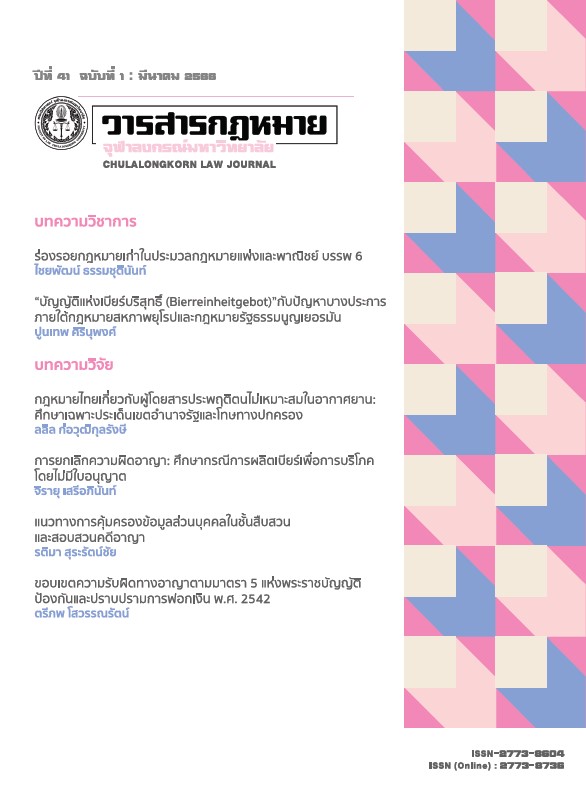ขอบเขตความรับผิดทางอาญาตามมาตรา 5 แห่งพระราชบัญญัติป้องกันและปราบปรามการฟอกเงิน พ.ศ. 2542
Main Article Content
บทคัดย่อ
การฟอกเงิน คือ การนำเงินหรือทรัพย์สินที่ได้มาจากการกระทำความผิด มาเปลี่ยนสภาพให้เป็นเงินหรือทรัพย์สินที่ได้มาอย่างถูกต้อง ซึ่งก่อให้เกิดความเสียหายต่อวงการธุรกิจและสังคม ตลอดจนเศรษฐกิจของประเทศ รัฐจึงต้องกำหนดให้การกระทำดังกล่าวเป็นความผิดเพื่อเป็นการตัดวงจรอาชญากรรม อย่างไรก็ดีการดำเนินคดีอาญาฟอกเงินกลับมีจำนวนน้อย เมื่อเทียบกับการดำเนินมาตรการทางแพ่งเกี่ยวกับการฟอกเงิน ทั้ง ๆ ที่ ลักษณะในการดำเนินมาตรการทางแพ่ง สำนักงานป้องกันและปราบปรามการฟอกเงินต้องเข้าไปข้องเกี่ยวกับทรัพย์สินที่เกี่ยวกับการกระทำความผิด และย่อมต้องคาดเห็นถึงผู้ที่อาจเป็นผู้กระทำความผิดฐานฟอกเงินได้ โดยสาเหตุส่วนหนึ่งของปัญหาการบังคับใช้ความผิดฐานฟอกเงินเป็นจำนวนน้อย อาจเป็นเพราะการขาดความรู้ความเข้าใจรูปแบบของการฟอกเงินที่บัญญัติเป็นความผิดอาญา รวมถึงปัญหาความไม่ชัดเจนของบทบัญญัติความผิดฐานฟอกเงิน ว่าควรตีความกว้างแค่ไหน อย่างไร
ด้วยเหตุนี้ บทความนี้จึงมุ่งที่จะศึกษาขอบเขตของความผิดตามมาตรา 5 แห่งพระราชบัญญัติป้องกันและปราบปรามการฟอกเงิน พ.ศ. 2542 โดยศึกษาปัญหาในการบังคับใช้ ศึกษาแนวความคิดและเจตนารมณ์ในการบัญญัติความผิดฐานฟอกเงิน โดยเฉพาะอย่างยิ่งความผิดตามมาตรา 5 (3) และนิยามของทรัพย์สินที่เกี่ยวกับการกระทำความผิด ตามมาตรา 3 พระราชบัญญัติป้องกันและปราบปรามการฟอกเงิน พ.ศ. 2542ที่แก้ไขเพิ่มเติมเมื่อปี พ.ศ. 2558 และวิเคราะห์ขอบเขตการบังคับใช้และการบัญญัติความผิดฐานฟอกเงินตามมาตรฐานสากล รวมถึงแสวงหาขอบเขตที่เหมาะสมในการบังคับใช้และบัญญัติความผิดฐานฟอกเงินของประเทศไทย เพื่อให้การป้องกันและปราบปรามการฟอกเงินมีประสิทธิภาพมากขึ้น
Article Details

อนุญาตภายใต้เงื่อนไข Creative Commons Attribution-NonCommercial-NoDerivatives 4.0 International License.
ลิขสิทธิ์และเนื้อหาในเว็บไซต์ของวารสารกฎหมาย (รวมถึง โดยไม่จำกัดเฉพาะ เนื้อหา รหัสคอมพิวเตอร์ งานศิลป์ ภาพถ่าย รูปภาพ ดนตรีกรรม โสตทัศนวัสดุ) เป็นกรรมสิทธิ์ของวารสารกฎหมาย และผู้ได้รับการโอนสิทธิทุกราย
1. วารสารกฎหมาย ให้อนุญาตให้คุณใช้สิทธิอันไม่เฉพาะเจาะจงที่สามารถถูกถอนเมื่อใดก็ได้ โดยไม่มีค่าใช้จ่าย ในการ
- เยี่ยมชมเว็บไซต์และเอกสารในเว็บไซต์นี้ จากคอมพิวเตอร์หรือเครื่องมือสื่อสารผ่านเว็บบราวเซอร์
- คัดลอกและจัดเก็บเว็บไซต์และเอกสารในเว็บไซต์นี้บนลงคอมพิวเตอร์ของคุณผ่านระบบความจำ cache
- สั่งพิมพ์เอกสารจากเว็บไซต์นี้สำหรับการใช้ส่วนตัวของคุณ
- ผลงานที่ได้รับการตีพิมพ์โดยวารสารกฎหมาย จุฬาลงกรณ์มหาวิทยาลัย ถูกคุ้มครองภายใต้ Creative Commons Attribution 4.0 International License ซึ่งอนุญาตให้ทุกคนสามารถคัดลอก แจกจ่าย ดัดแปลง ส่งต่อ ผลงานได้ ก็ต่อเมื่อผลงานและแหล่งข้อมูลได้รับการอ้างอิงอย่างเหมาะสม
2. วารสารกฎหมาย จุฬาลงกรณ์มหาวิทยาลัย สงวนสิทธิ์ไม่อนุญาตให้คุณใช้สิทธิอื่นใดที่เกี่ยวข้องกับเว็บไซต์และเอกสารบนเว็บไซต์นี้ เช่น การคัดลอก ดัดแปลง เปลี่ยนแปลง ส่งต่อ ตีพิมพ์ แจกจ่าย เผยแพร่ จัดแสดงในที่สาธารณะ ไม่ว่าจะในรูปแบบใดก็ตาม ซึ่งเว็บไซต์หรือเอกสารบนเว็บไซต์ โดยไม่อ้างอิงถึงแหล่งข้อมูลหรือโดยไม่ได้รับอนุญาตเป็นลายลักษณ์อักษรจากวารสารกฎหมาย จุฬาลงกรณ์มหาวิทยาลัย
3. คุณอาจขออนุญาตที่จะใช้เอกสารอันมีลิขสิทธิ์บนเว็บไซต์นี้โดยการเขียนอีเมลล์มายัง journal@law.chula.ac.th
4. วารสารกฎหมาย จุฬาลงกรณ์มหาวิทยาลัย เข้มงวดกับการคุ้มครองลิขสิทธิ์อย่างมาก หากวารสารกฎหมาย จุฬาลงกรณ์มหาวิทยาลัยพบว่าคุณได้ใช้เอกสารอันมีลิขสิทธิ์บนเว็บไซต์นี้โดยไม่ถูกต้องตามการอนุญาตให้ใช้สิทธิ ดังที่กล่าวไปข้างต้น วารสารกฎหมาย จุฬาลงกรณ์มหาวิทยาลัยอาจดำเนินคดีตามกฎหมายต่อคุณได้ เพื่อเรียกร้องค่าเสียหายที่เป็นตัวเงินและคำขอชั่วคราวให้คุณหยุดการใช้เอกสารดังกล่าว ทั้งนี้ คุณอาจถูกสั่งให้ชดใช้ค่าใช้จ่ายใดๆ ที่เกี่ยวข้องกับการดำเนินการตามกฎหมายนี้
หากคุณพบเห็นการใช้เอกสารอันมีลิขสิทธิ์ของวารสารกฎหมาย จุฬาลงกรณ์มหาวิทยาลัย ที่ขัดหรืออาจขัดต่อการอนุญาตให้ใช้สิทธิดังที่ได้กล่าวไปข้างต้น โดยเชื่อว่าได้ละเมิดลิขสิทธิ์ของคุณหรือของผู้อื่น สามารถร้องเรียนมาได้ที่ journal@law.chula.ac.th
เอกสารอ้างอิง
BGH 1 StR 595/15 - July 12, 2016 (LG Cottbus)
Comply Advantage. The new regulation of money laundering in Germany (§ 261 StGB new version). [Online] Available from : https://legacy.complyadvantage.com/de/knowledgebase/die-neuregelung-der-geldwaesche-in-deutschland-%C2%A7-261-stgb-n-f/ [5 March 2022]
CPS Nottinghamshire v Rose; R v Whitwam [2008] EWCA Crim 239
Deutscher Bundestag. Einzelfragen zur Geldwäsche Strafrechtliche Betrachtung. 7 April 2021.
Douglas Husak. Overcriminalization: The Limits of the Criminal Law. Oxford: Oxford University Press, 2008.
Edwin H. Sutherland. White Collar Crime. New York : Holt, Rinehart and Winston, 1961.
R (Wilkinson) v Director of Public Prosecutions) [2006] EWHC 3012
R v Linegar (Scott Anthony) (2009) [2009] EWCA Crim 648
Section 261 (7) Strafgesetzbuch (StGB)
section 261 (7) Strafgesetzbuch (StGB) ของสหพันธ์สาธารณรัฐเยอรมนี
YOUSSEF HABIB NAHLOUS v R [2010] NSWCCA 58, BC201002045
เกียรติขจร วัจนะสวัสดิ์. คำอธิบายกฎหมายอาญา ภาค 1. พิมพ์ครั้งที่ 10. กรุงเทพฯ: สำนักพิมพ์ พลสยาม พริ้นติ้ง, 2551.
โกเมศ ขวัญเมือง พระครูธรรมธรสฐาพร ปภสฺสโร และพระครูปลัดอุดร ปริปุณฺโณ. การแบ่งประเภทของความผิดอาญา. วารสาร มจร สังคมศาสตร์ปริทรรศน์ 10, 2 (เมษายน- มิถุนายน 2564): 399.
ไชยยศ เหมะรัชตะ. กฎหมายป้องกันและปราบปรามการฟอกเงิน. วารสารกฎหมาย คณะนิติศาสตร์ จุฬาลงกรณ์มหาวิทยาลัย 16, 2 (2539): 8.
กรกช อัมพุช. ผลกระทบของความผิดมูลฐานเรื่องสมาชิกอั้งยี่ตามพระราชบัญญัติป้องกันและปราบปรามการฟอกเงิน พ.ศ. 2542 ต่อการประกอบธุรกิจในประเทศไทย. เอกัตศึกษาปริญญามหาบัณฑิต สาขาวิชากฎหมายเศรษฐกิจ คณะนิติศาสตร์ จุฬาลงกรณ์มหาวิทยาลัย, 2561.
กรมพัฒนาธุรกิจการค้า. ข้อมูลเบื้องต้นเกี่ยวกับมาตรการด้านการป้องกันและปราบปรามการฟอกเงินและการต่อต้านการสนับสนุนทางการเงินแก่การก่อการร้าย. 27 สิงหาคม 2562.
กรมพัฒนาธุรกิจการค้า. ข้อมูลเบื้องต้นเกี่ยวกับมาตรการด้านการป้องกันและปราบปรามการฟอกเงินและการต่อต้านการสนับสนุนทางการเงินแก่การก่อการร้าย. 27 สิงหาคม 2562.
ข้อ 1 (b) UNSC 1373 (2001)
ข้อ 2 (e) UNSC 1373 (2001)
ข้อ 3 (1C) (i) อนุสัญญาสหประชาชาติว่าด้วยการต่อต้านการลักลอบค้ายาเสพติดและวัตถุที่ออกฤทธิ์ต่อจิตประสาท ค.ศ. 1988
ข้อ 4 คำแนะนำของคณะกรรมการพัฒนากฎหมาย เรื่อง กำหนดโทษอาญาในทางกฎหมาย
ข้อ 6 (B) (i) อนุสัญญาสหประชาชาติว่าด้วยการต่อต้านองค์กรอาชญากรรมข้ามชาติที่จัดตั้งในลักษณะองค์กร ค.ศ. 2000
ข้อ 6 (E) อนุสัญญาสหประชาชาติว่าด้วยการต่อต้านองค์กรอาชญากรรมข้ามชาติที่จัดตั้งในลักษณะองค์กร ค.ศ. 2000
ข้อที่ 3 ข้อแนะนำของคณะทำงานเฉพาะกิจเพื่อดำเนินมาตรการเกี่ยวกับการฟอกเงิน
ข้อที่ 4 ข้อแนะนำของคณะทำงานเฉพาะกิจเพื่อดำเนินมาตรการเกี่ยวกับการฟอกเงิน
คณพล จันทน์หอม, หลักพื้นฐาน กฎหมายอาญา เล่ม 1. กรุงเทพฯ: สำนักพิมพ์วิญญูชน, 2563.
คณะกรรมาธิการวิสามัญ. บันทึกการประชุมคณะกรรมาธิการวิสามัญพิจารณาร่างพระราชบัญญัติป้องกันและปราบปรามสนับสนุนทางการเงินแก่การก่อการร้าย (ฉบับที่ ..) พ.ศ. .... ครั้งที่ 2. 27 เมษายน 2558.
คณะกรรมาธิการวิสามัญ. บันทึกการประชุมคณะกรรมาธิการวิสามัญพิจารณาร่างพระราชบัญญัติป้องกันและปราบปรามสนับสนุนทางการเงินแก่การก่อการร้าย (ฉบับที่ ..) พ.ศ. .... ครั้งที่ 14/2558. 17 มิถุนายน 2558.
คณะกรรมาธิการวิสามัญ. สรุปผลการพิจารณาร่างพระราชบัญญัติป้องกันและปราบปรามการฟอกเงิน (ฉบับที่ ..) พ.ศ. .... ใช้ประกอบการประชุมวันที่ 6 กรกฎาคม 2558.
คำพิพากษาศาลฎีกาที่ 283/2565
ธัชพงษ์ วงษ์เหรียญทอง. การดำเนินคดีซ้ำ : ศึกษาผลคำพิพากษาศาลต่างประเทศต่อการฟ้องคดีอาญาในประเทศไทย. วิทยานิพนธ์ปริญญาดุษฎีบัณฑิต คณะนิติศาสตร์ มหาวิทยาลัยธรรมศาสตร์, 2558.
นงศิรนารถ กุศลวงษ์. บทวิเคราะห์ปัญหาคดีอาญาฟอกเงินในประเทศไทย. วารสารกระบวนการยุติธรรม 10, 2 (พฤษภาคม-สิงหาคม 2560): 104.
มาตรา 114 พระราชบัญญัติให้ใช้ประมวลกฎหมายยาเสพติด พ.ศ. 2564
มาตรา 18 ประมวลกฎหมายอาญา
มาตรา 3 พระราชบัญญัติป้องกันและปราบปรามการฟอกเงิน พ.ศ. 2542
มาตรา 82 ประมวลกฎหมายอาญา
รณกรณ์ บุญมี. ข้อสังเกตบางประการเกี่ยวกับเหตุยกเว้นความผิดและเหตุยกเว้นโทษ. วารสารนิติศาสตร์ 40, 2 (มิถุนายน 2554): 329-330.
วีระพงษ์ บุญโญภาส. กระบวนการยุติธรรมกับกฎหมายป้องกันและปราบปรามการฟอกเงิน. พิมพ์ครั้งที่ 1. กรุงเทพฯ: สำนักพิมพ์นิติธรรม, 2547.
สถาบันเพื่อการยุติธรรมแห่งประเทศไทย. สรุปการสัมมนาทางวิชาการ หัวข้อ คดีล้นศาล นักโทษล้นคุก ปัญหาจุกอกกระบวนการยุติธรรมไทย. 19 สิงหาคม 2558.
สัมภาษณ์ พ.ต.อ.สีหนาท ประยูรรัตน์, ที่ปรึกษาประจำสำนักงานป้องกันและปราบปรามการฟอกเงิน, 14 ธันวาคม 2559. อ้างถึงใน นงศิรนารถ กุศลวงษ์. บทวิเคราะห์ปัญหาคดีอาญาฟอกเงินในประเทศไทย. วารสารกระบวนการยุติธรรม 10, 2 (พฤษภาคม-สิงหาคม 2560): 108.
สำนักกฎหมาย สำนักงานเลขาธิการวุฒิสภา. เอกสารประกอบการพิจารณา ร่างพระราชบัญญัติป้องกันและปราบปรามการฟอกเงิน (ฉบับที่ ..) พ.ศ. .... (คณะรัฐมนตรีเป็นผู้เสนอ). 2 เมษายน 2558.
สำนักงานป้องกันและปราบปรามการฟอกเงิน. ตารางเปรียบเทียบพระราชบัญญัติป้องกันและปราบปรามการฟอกเงิน พ.ศ. 2542 กับร่างพระราชบัญญัติป้องกันและปราบปรามการฟอกเงิน (ฉบับที่ ..) พ.ศ. .... ที่ผ่านการตรวจพิจารณาของสำนักงานคณะกรรมการกฤษฎีกา.
สำนักงานป้องกันและปราบปรามการฟอกเงิน. รายงานประจำปี พ.ศ. 2564. กรุงเทพฯ: บริษัท ออนป้า จำกัด, 2565.
สำนักรายงานการประชุมและชวเลข สำนักงานเลขาธิการวุฒิสภา. รายงานการประชุมสภานิติบัญญัติแห่งชาติ ครั้งที่ 51. 21 สิงหาคม 2558.
สีหนาท ประยูรรัตน์. คำอธิบายพระราชบัญญัติป้องกันและปราบปรามการฟอกเงิน พ.ศ. 2542. พิมพ์ครั้งที่ 1. กรุงเทพฯ: ส.เอเชีย เพลส, 2542.
สุธิดา กาญจนะวงศ์. การดำเนินคดีอาญาซ้ำชั้นเจ้าพนักงาน. วิทยานิพนธ์ปริญญามหาบัณฑิต สาขาวิชานิติศาสตร์ บัณฑิตวิทยาลัย มหาวิทยาลัยธุรกิจบัณฑิตย์, 2550.
สุนทรา พลไตร. มาตรการดำเนินคดีกับผู้กระทำความผิดฐานทุจริตให้เป็นไปตามพระราชบัญญัติป้องกันและปราบปรามการฟอกเงิน. วารสารกระบวนการยุติธรรม 11, 3 (กันยายน-ธันวาคม 2561): 133.


